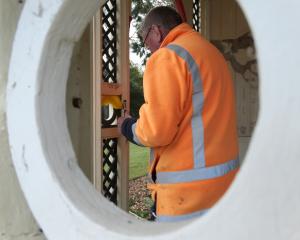Waitaha spokesman Wayne Stringer said the site was "a really important resource" and sacred to his people.
It had been used as a sea garden containing kina, paua, crayfish and seaweed and was where the tribe had harvested the eggs of seagulls gathered from around the rocks, he said.
The Forrester Heights project has been dogged by disputes over the status of the land, designated as reserve land under the Reserves Act, since it was first proposed in 2006; when $3 million in profits were earmarked to help pay for the $10.2 million refurbishment of the opera house in Oamaru.
The council believed a mistake had been made in 1937, when the land, which had been set aside for endowment for the benefit of the Oamaru Borough Council in 1885, was made subject to a predecessor of the Reserves Act.
The 27-section, 5.8ha subdivision on Cape Wanbrow overlooking Oamaru Harbour, coast and town was placed back on the Waitaki District Council's (WDC) agenda after the national Reserves and Other Lands Bill was held up in Parliament.
Because of that delay, the council withdrew the section of the original Bill referring to Forrester Heights and decided to go it alone with its own local member's Bill, which it intends will clarify the land's status, as well as the status of two other parcels of land, in Oamaru and Palmerston.
Mr Stringer, who testified at a select committee hearing in Wellington about two years ago, said recent council comment about consultation with Ngai Tahu meant little.
"Ngai Tahu would say they subsumed Waitaha by marriage; something which Waitaha would strongly deny. It's got nothing to do with Ngai Tahu."
He did not believe an error had been made in 1937.
The council's property manager, Dougall McIntyre, referred comment to lawyers Dean and Associates.
Partner therein Benjamin Coleman said the Lookout Point land had been bought by the New Zealand government from Ngai Tahu in 1848 as part of the Kemp purchase, which included the town of Oamaru; before being set aside as endowment land for the benefit of the Oamaru Borough Council in 1885.
An "administrative oversight" in 1937 had vested the land as a reserve.
"Reserve status and endowment status are two completely separate concepts and this may not have been fully appreciated in 1937 ... when the land was "reserved" as an endowment in 1885 it was not intended that the land be classified as a reserve itself," he said.
"The Bill simply seeks to address the clerical error made in 1937." The council had consulted with the Crown Property Manager of Linz, Ngai Tahu, the Department of Conservation, the Commissioner of Crown Lands, Waitaki MP Jacqui Dean and the Parliamentary Counsel Office to clarify the Bill's issues. All had consented to its content and objectives, he said.
Ngai Tahu had, after taking considerable advice on the matter, confirmed to Linz it believed the WDC had a right to freehold title and was therefore not subject to the Ngai Tahu Claims Settlement Act 1998.
Waitaha's claim of sovereignty would need to be addressed directly to Ngai Tahu, which, under the Ngai Tahu Settlement Act 1998, was defined as descendants from the hapu of Waitaha, meaning it had the right to speak on Waitaha's behalf, he said.
If during the proposed development any urupa, traditional sites, taonga, koiwi or other archaeological items were discovered, works would immediately cease, the site would be secured and the relevant tangata whenua or New Zealand Places Historic Trust would be notified.
Waitaha chairman Steven Bray said his people were taking their grievances to the Waitangi Tribunal to challenge "a lot of misinformed comments" made by Ngai Tahu.
The WDC had made an accord to consult Waitaha, and references to the site were recognised in local government papers.
"We've always said to them: please consult with us."





